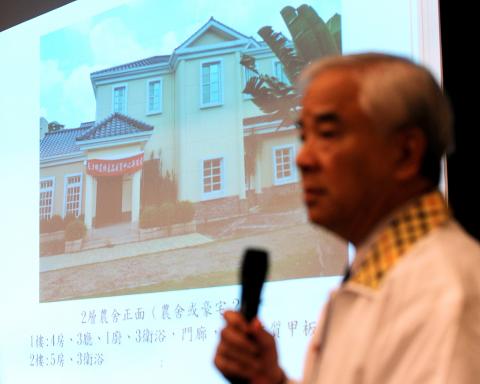The Control Yuan yesterday voted 6-4 to impeach former Council of Agriculture (COA) chairman Su Jia-chyuan (蘇嘉全) for illegally constructing a luxury farmhouse on agricultural land without engaging in any agriculture.
“Su used his administrative privileges during his terms as Pingtung County commissioner, minister of the interior and COA chairman to build a farmhouse on an agricultural land as a mansion for his own use. None of the equipment or the remaining land were found to be used for agriculture, which constitutes a violation of the Agricultural Development Act (農業發展條例),” the Control Yuan told a press conference following a meeting to discuss the case.
Su, the Democratic Progressive Party’s (DPP) candidate for vice president in the January presidential election, was embroiled in controversy in the run-up to the election for building the farmhouse on agricultural land in Pingtung County for residential use.

Photo: Fang Pin-chao, Taipei Times
To end months of controversy, Su donated his farmhouse and the farmland to the county’s Changchih (長治) Township Office in October last year and moved his family away from the property.
According to the impeachment statement, in addition to the agricultural land, other farming and grazing land registered under Su’s name was used for Su’s ancestral graves, while the farmhouse itself occupied some township-owned land “with an alleged intention of long-term occupation of state property” and was therefore deemed to violate the Non-urban Land Use Control Regulations (非都市土地使用管制規則).
“As a long-time public servant, Su should have abided by the regulations and set a good example, but instead, he was involved in two cases of illegal land use, used his privileges for personal gain and deliberately broke the laws,” the statement said.
“In light of Su’s aforementioned wrongdoings and his later refusal to undergo Control Yuan questioning, which constituted a breach of the Civil Servants Work Act (公務員服務法), the Control Yuan voted in favor of impeachment and referred Su to the Judicial Yuan’s Commission on the Disciplinary Sanctions of Functionaries for deliberation,” it said.
DPP spokesperson Lin Chun-hsien (林俊憲) said the decision showed the “decadence” of the Control Yuan and “exactly why” it had lost people’s trust and confidence.
Su’s case and the Yu Chang Biologics Co (宇昌生技股份有限公司) case involving former DPP chairperson Tsai Ing-wen (蔡英文) were both “obvious mud-slinging campaign tactics and political maneuvers” during the presidential campaign, he said.
“While the courts ruled that Su and Tsai were innocent, the Control Yuan still won’t let go and appears determined to pursue the cases to the very end,” Lin said.
“The DPP cannot accept the decision, plain and simple,” Lin said.
At a press conference at Tsai’s foundation, where he now serves as a board member, Su said the decision was a political maneuver “even after the presidential election.”
“Is it necessary for the Control Yuan to come up with the politically motivated impeachment more than six months after the presidential election?” Su asked.

CHAOS: Iranians took to the streets playing celebratory music after reports of Khamenei’s death on Saturday, while mourners also gathered in Tehran yesterday Iranian Supreme Leader Ayatollah Ali Khamenei was killed in a major attack on Iran launched by Israel and the US, throwing the future of the Islamic republic into doubt and raising the risk of regional instability. Iranian state television and the state-run IRNA news agency announced the 86-year-old’s death early yesterday. US President Donald Trump said it gave Iranians their “greatest chance” to “take back” their country. The announcements came after a joint US and Israeli aerial bombardment that targeted Iranian military and governmental sites. Trump said the “heavy and pinpoint bombing” would continue through the week or as long

TRUST: The KMT said it respected the US’ timing and considerations, and hoped it would continue to honor its commitments to helping Taiwan bolster its defenses and deterrence US President Donald Trump is delaying a multibillion-dollar arms sale to Taiwan to ensure his visit to Beijing is successful, a New York Times report said. The weapons sales package has stalled in the US Department of State, the report said, citing US officials it did not identify. The White House has told agencies not to push forward ahead of Trump’s meeting with Chinese President Xi Jinping (習近平), it said. The two last month held a phone call to discuss trade and geopolitical flashpoints ahead of the summit. Xi raised the Taiwan issue and urged the US to handle arms sales to

State-run CPC Corp, Taiwan (CPC, 台灣中油) yesterday said that it had confirmed on Saturday night with its liquefied natural gas (LNG) and crude oil suppliers that shipments are proceeding as scheduled and that domestic supplies remain unaffected. The CPC yesterday announced the gasoline and diesel prices will rise by NT$0.2 and NT$0.4 per liter, respectively, starting Monday, citing Middle East tensions and blizzards in the eastern United States. CPC also iterated it has been reducing the proportion of crude oil imports from the Middle East and diversifying its supply sources in the past few years in response to geopolitical risks, expanding

Pro-democracy media tycoon Jimmy Lai’s (黎智英) fraud conviction and prison sentence were yesterday overturned by a Hong Kong court, in a surprise legal decision that comes soon after Lai was jailed for 20 years on a separate national security charge. Judges Jeremy Poon (潘兆初), Anthea Pang (彭寶琴) and Derek Pang (彭偉昌) said in the judgement that they allowed the appeal from Lai, and another defendant in the case, to proceed, as a lower court judge had “erred.” “The Court of Appeal gave them leave to appeal against their conviction, allowed their appeals, quashed the convictions and set aside the sentences,” the judges